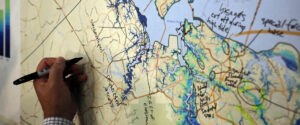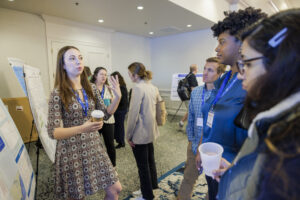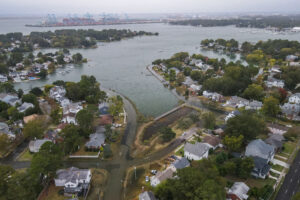Behind every good leader, there’s a…Knauss Fellow?
Within a week, Pamela Braff went from a risk management meeting and snorkeling on a coastal reserve in Hawai’i to working from home in her D.C. apartment, all in support of senior leadership at NOAA’s National Ocean Service as a Knauss Coastal & Marine Policy Fellow.
“The pace of deadlines is so much different and so much more dynamic, and I couldn’t tell you what I’ll be doing a week from now,” Braff said. “There are these big picture things that we’re always working on in the background, but the day-to-day is constantly changing.”
As a Ph.D. student at the Virginia Institute of Marine Science studying wetlands, Braff could plot out her research schedule months in advance. But as a Knauss Fellow, a new request for information might mean that Braff’s schedule changes halfway through the day.
“The ocean service and NOAA leadership, they go from meeting to meeting to meeting every day all day,” Braff said. “Their schedules are crazy and insane and they’re not tracking what’s going on — they’re not able to — so we help them track those things and then remind them of that before an event.”
Braff likened her role to an episode of West Wing — As a special assistant, Braff collected information for events and meetings, tracked legislation or new policy initiatives, and helped draft remarks for Senior Advisor for Coastal Inundation and Resilience Mark Osler. “Basically, my job is to help him do his job better,” she said.
When Osler was asked to speak during a congressional hearing on federal flood maps, Braff helped prepare his testimony about NOAA’s role in coastal resilience. In addition to Osler’s spoken remarks, the members of House Committee on Science, Space, and Technology had opportunities to ask questions, so Braff anticipated questions they were likely to ask and prepared answers. After the hearing, Braff helped respond to follow-up inquiries from congressional staff.
“The pace of deadlines is so much different and so much more dynamic, and I couldn’t tell you what I’ll be doing a week from now,” Braff said.
“I’ve gotten a much better perspective of the federal landscape now than I ever had before.”
“We’ve seen a lot of the content from those conversations showing up in some proposed legislation,” Braff said. “That’s been cool to see how those conversations turn into action.”
Even beyond the hearing, responding to congressional inquiries was a large part of Braff’s day-to-day work. Sometimes, staffers would reach out more formally to request technical information related to coastal resilience. Other times, requests were more informal — like when an appropriations staffer asked her to explain a tweet about sea level rise to an appropriations staffer.
She said her experience before the fellowship working on local resilience issues like “which road is going to flood?” gave her a better understanding of the resilience tools and initiatives that were discussed at the federal level.
After the fellowship, Braff left Washington, D.C., for the other Washington, where she will serve as the climate program manager for the City of Olympia. There, she will help the city with local resilience policies, like helping the city meet their greenhouse gas emission reduction goals.
“I’ve gotten a much better perspective of the federal landscape now than I ever had before,” Braff said. “I have all these ideas about how we can bring that into the city.”
Photos and Video by Aileen Devlin | Virginia Sea Grant
Photos contributed by Pamela Braff
Published May 7, 2021.
After the fellowship, Braff left Washington, D.C., for the other Washington, where she will serve as the climate program manager for the City of Olympia.





